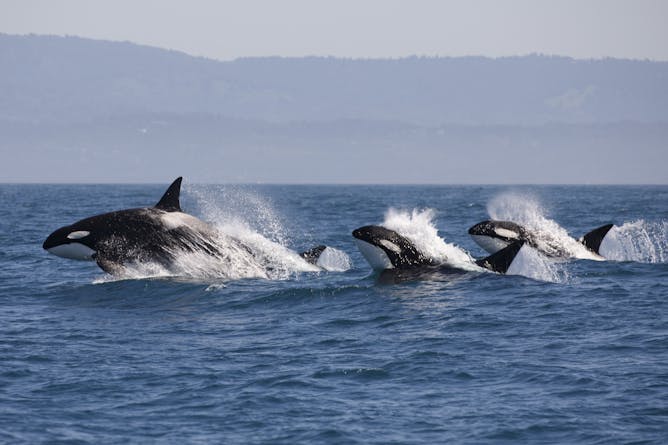|
Toxic chemicals in the ocean are picked up by tiny plankton, which are then eaten by fish, and then bigger fish – and so on. As they work their way up the food chain, the concentration of these chemicals increases. Indeed, scientists have now discovered that killer whales have dangerous levels of toxic “PCBs” in their bodies and that this could wipe out entire populations. Crispin Halsall has tracked these chemicals for decades and explains how they created an orca crisis, and what we can do about it.
And Jose Perez-Casal tells us about a new vaccine, developed through collaboration between Kenyan and Canadian scientists, that could prevent a serious lung plague that causes disease and death in cattle in Africa – which leads to more than US$60 million in losses annually.
|

Tory Kallman / shutterstock
Crispin Halsall, Lancaster University
PCBs were phased out three decades ago. But they're still lingering in the ocean.
|

A Masai herdsman walks with his cattle in Amboseli National Park in Kenya.
(Shutterstock)
Jose Perez-Casal, University of Saskatchewan
Lung plague attacks cattle causing disease and death, and more than US$60 million in losses annually in Africa. A new vaccine could prevent the disease.
|
Health + Medicine
|

Dominic Tran, University of Sydney
You might be thin on the outside, but if you have a poor diet and are physically inactive, you can have the same health risks as someone who is obese.
| |

Maisam Najafizada, Memorial University of Newfoundland; Jill Allison, Memorial University of Newfoundland
Women health-care volunteers in places like Nepal, Afghanistan and Ethiopia play a vital role in the health system, yet they are undervalued and undertrained.
|
|
|
Politics + Society
|
-
Carol Harrington, Victoria University of Wellington
The #MeToo movement has attracted mainstream media attraction, but women are using many digital platforms to share their experiences of sexual violence.
|
|
Science + Technology
|
-
Joel Wooten, University of South Carolina
It has been 10 years since Elon Musk's SpaceX launched the commercial space age. What hurdles must be overcome before private companies begin exploring, colonizing and mining other planets?
|
|